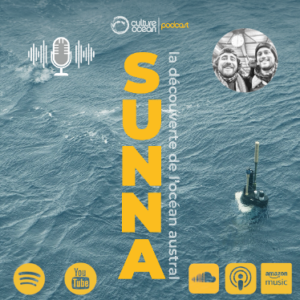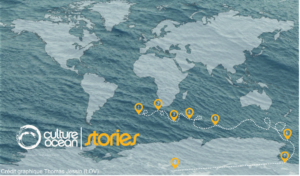Alongside SUNNA, an oceanographic robot as daring as it is curious, you will dive into a frozen and hostile environment to uncover its secrets. Over the course of seven episodes, our hero will gather invaluable scientific data to better understand the workings of the ocean, meeting the familiar inhabitants of this environment along the way.
The Southern Ocean and Argo Profiling Floats
The setting for this audio adventure is the Southern Ocean, a vast ring of cold water encircling Antarctica. This wild and untamed region is renowned for its towering waves and fierce winds. Despite its harshness, the Southern Ocean teems with life and plays a vital role in a vast physical and chemical system that even influences the oxygen we breathe!
SUNNA, the narrator of this series, is an Argo profiling float—a cylindrical device about two meters tall capable of diving to depths of up to 2,000 meters. There, it measures a myriad of scientific parameters. As true sentinels of the ocean and its changes, Argo floats offer crucial insights into marine changes and helping us deepen our understanding of the marine world.
Origins of the Adventure
Behind this immersive journey are two freshly graduated young oceanographers who had the original idea of telling the story of the ocean through the “eyes” of a robot. Marin Cornec and Théo Sciandra met as students in Paris and share a deep passion for the ocean and a desire to share that passion with the public. Marin, originally from Bordeaux, was lulled by the rolling of wine barrels, while Théo, born in a “pan bagnat,” hails from Villefranche-sur-Mer. The idea for this podcast emerged one sunny afternoon on the terrace of their favorite café. Once they had settled on the name of their hero, they began writing the explorer’s adventures.
Produced by Culture Océan (the outreach arm of the Villefranche-sur-Mer Oceanography Laboratory), this audio series was crafted across two continents. While Théo lends his playful voice to SUNNA from France, Marin crafts the soundscapes for the episodes from the United States, incorporating real underwater sound recordings. With limited resources, voice recording took place in an improvised studio featuring a room divider and blankets for soundproofing—and even a kitchen whisk as a microphone holder.
After five years of work and countless email and phone exchanges, SUNNA’s adventures are finally ready to be shared!
Dive into the Soundscapes of the Southern Ocean!
Curious to hear the crackling of sea ice, the lively calls of a penguin colony, or the bustling ambiance of a research vessel? Slip on your best pair of headphones and immerse yourself in SUNNA’s adventures, now available on your favorite listening platform.
A podcast available (in French!) on:
👉 Youtube : https://bit.ly/3YFppma
👉 Spotify : https://spoti.fi/3JrHI78
👉 Apple Podcast : https://apple.co/3vY6Rmz
👉 Soundcloud : https://bit.ly/48wvyWd
👉 Amazon Music : https://amzn.to/4b09ByD
Culture Océan: https://culture-ocean.com/index-en.html
Bioeochemical-Argo infos : https://biogeochemical-argo.org/
Authors:
Marin Cornec and Théo Sciandra


